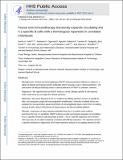Peanut oral immunotherapy transiently expands circulating Ara h 2–specific B cells with a homologous repertoire in unrelated subjects
Author(s)
Calatroni, Agustin; Tadigotla, Vasisht R.; Ruiter, Bert; Ma, Alex; Moon, James; Shreffler, Wayne G.; Patil, Sarita; Ogunniyi, Adebola Oluwakayode; Love, John C; ... Show more Show less
DownloadLove_Peanut oral.pdf (1.343Mb)
PUBLISHER_CC
Publisher with Creative Commons License
Creative Commons Attribution
Terms of use
Metadata
Show full item recordAbstract
Background
Peanut oral immunotherapy (PNOIT) induces persistent tolerance to peanut in a subset of patients and induces specific antibodies that might play a role in clinical protection. However, the contribution of induced antibody clones to clinical tolerance in PNOIT is unknown.
Objective
We hypothesized that PNOIT induces a clonal, allergen-specific B-cell response that could serve as a surrogate for clinical outcomes.
Methods
We used a fluorescent Ara h 2 multimer for affinity selection of Ara h 2–specific B cells and subsequent single-cell immunoglobulin amplification. The diversity of related clones was evaluated by means of next-generation sequencing of immunoglobulin heavy chains from circulating memory B cells with 2x250 paired-end sequencing on the Illumina MiSeq platform.
Results
Expression of class-switched antibodies from Ara h 2–positive cells confirms enrichment for Ara h 2 specificity. PNOIT induces an early and transient expansion of circulating Ara h 2–specific memory B cells that peaks at week 7. Ara h 2–specific sequences from memory cells have rates of nonsilent mutations consistent with affinity maturation. The repertoire of Ara h 2–specific antibodies is oligoclonal. Next-generation sequencing–based repertoire analysis of circulating memory B cells reveals evidence for convergent selection of related sequences in 3 unrelated subjects, suggesting the presence of similar Ara h 2–specific B-cell clones.
Conclusions
Using a novel affinity selection approach to identify antigen-specific B cells, we demonstrate that the early PNOIT-induced Ara h 2–specific B-cell receptor repertoire is oligoclonal and somatically hypermutated and shares similar clonal groups among unrelated subjects consistent with convergent selection.
Key words
Immunotherapy; antigen-specific B cells; peanut allergy; food allergy; antibody repertoire
Abbreviations used
APC, Allophycocyanin; BCR, B-cell receptor; CDR, Complementarity-determining region; NGS, Next-generation sequencing; OIT, Oral immunotherapy; PNOIT, Peanut oral immunotherapy
Date issued
2015-05Department
Massachusetts Institute of Technology. Department of Chemical Engineering; Koch Institute for Integrative Cancer Research at MITJournal
Journal of Allergy and Clinical Immunology
Publisher
Elsevier
Citation
Patil, Sarita U.; Ogunniyi, Adebola O.; Calatroni, Agustin; Tadigotla, Vasisht R.; Ruiter, Bert; Ma, Alex; Moon, James; Love, J. Christopher and Shreffler, Wayne G. “Peanut Oral Immunotherapy Transiently Expands Circulating Ara h 2–specific B Cells with a Homologous Repertoire in Unrelated Subjects.” Journal of Allergy and Clinical Immunology 136, no. 1 (July 2015): 125–134.e12 © 2015 American Academy of Allergy, Asthma & Immunology.
Version: Author's final manuscript
ISSN
0091-6749